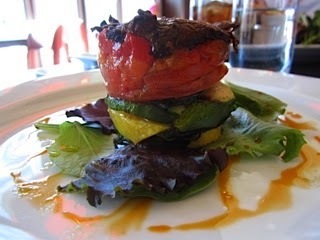Beth Kephart's Blog, page 59
January 12, 2015
does the entire book lie within its first two sentences? Herman Koch and a Kephart experiment
 The only thing benign about Herman Koch's The Dinner is the title—which, like almost everything else about the story, is designed to throw the reader off. "My Dinner with Andre" this is not. Politics, culture, morality, and childrens' lives are at stake (only the first three were at stake in the movie). The questions: What would we do to protect a child who has committed a heinous act? What would we do if we had somehow (implicitly, explicitly) encouraged or modeled or genetically produced an evil creature? Who do we love and why do we love them and what does familial happiness look like? At what cost, secrets?
The only thing benign about Herman Koch's The Dinner is the title—which, like almost everything else about the story, is designed to throw the reader off. "My Dinner with Andre" this is not. Politics, culture, morality, and childrens' lives are at stake (only the first three were at stake in the movie). The questions: What would we do to protect a child who has committed a heinous act? What would we do if we had somehow (implicitly, explicitly) encouraged or modeled or genetically produced an evil creature? Who do we love and why do we love them and what does familial happiness look like? At what cost, secrets?All this unfolds over the course of a meal in an expensive restaurant. Two brothers and their wives have come to High Civility to discuss a horrific, seamy event. Paul, whose jealousy and creepiness are transparent from the start, tells us the story. He tells us who he is, even as he repeatedly cautions that many parts of the tale are not our business.
It's a brutal, brilliant book (compared to Gone Girl, I think it greatly supersedes it). It's not the kind of book I typically read, but I was riveted. And then I got to the paperback's extra matter and an essay by Koch himself called "The First Sentence."
For me, a book is already finished once I've come up with the first sentence. Or rather: the first two sentences. Those first two sentences contain everything I need to know about the book. I sometimes call them the book's "DNA." As long as every sentence that comes afterward contains that same DNA, everything is fine.
Koch's first two sentences, in case you are wondering, are: "We were going out to dinner. I won't say which restaurant, because next time it might be full of people who've come to see whether we're there." And absolutely, yes. The entire book is bracketed within them.
I believe in the power of first sentences, too. I think about them as setters of mood and tone. I wondered, though, whether I could say, about any of my novels, that the entire story rests within the first two sentences. I decided to conduct a mini-experiment. I grabbed a few books from my shelf. Opened to page one. Conducted a self-interview and assessment. I had to cheat in one place only (Dr. Radway), where more than two sentences were required. Otherwise, I'm thinking Koch is onto something here. (And if it is true for my books, I suspect it is true for yours, too.)
Once I saw a vixen and a dog fox dancing. It was on the other side of the cul-de-sac, past the Gunns' place, through the trees, where the stream draws a wet line in spring. — UndercoverIn the summer my mother grew zinnias in her window boxes and let fireflies hum through our back door. She kept basil alive in ruby-colored glasses and potatoes sprouting tentacles on the sills. — House of Dance
There are the things that have been and the things that haven't happened yet. There is the squiggle of a line between, which is the color of caution, the color of the bird that comes to my window every morning, rattling me awake with the hammer of its beak. — Nothing but GhostsWhat I remember now is the bunch of them running: from the tins, which were their houses. Up the white streets, which were the color of bone. — The Heart Is Not a SizeFrom up high, everything seems to spill from itself. Everything is shadowed. — Dangerous NeighborsMy house is a storybook house. A huff-and-a-puff-and-they'll-blow-it-down house. — You Are My Only
The streets of Seville are the size of sidewalks, and there are alleys leaking off from the streets. In the back of the cab, where I sit by myself, I watch the past rushing by. — Small Damages
There was a story Francis told about two best friends gone swimming, round about Beiderman's Point, back of Petty's Island, along the crooked Delaware. "Fred Spowhouse," he'd say, his breath smelling like oysters and hay. "Alfred Edwards." The two friends found drowned and buckled together, Spowhouse clutched up tight inside Edwards's feckless arms. — Dr. Radway's Sarsaparilla Resolvent
We live with ghosts. We live with thugs, dodgers, punkers, needle ladies, pork knuckle. — Going Over
If you could see me. If you were near. — One Thing Stolen
Sidenote: In every case, the first two sentences of my books existed within the book in draft one. Sometimes they weren't posted right up front in early drafts. But they always eventually got there.




Published on January 12, 2015 05:09
January 10, 2015
the importance of the imagination, in memoir (Jen Percy on Brian Turner)

Brian Turner's immaculate memoir, My Life as a Foreign Country, is reviewed today in the New York Times Book Review by Jen Percy.
The book itself is so well worth reading. (My thoughts about it are here.)
But the review is also a glory, opening with this paragraph about the importance of the empathetic imagination in memoir. Empathy may be nearly impossible to teach. But it does differentiate the great memoirs from the merely articulate ones, the we stories from the me tales. It's what should matter most to the makers and readers of memoir.
Jen Percy speaks of all this with bright, crisp words. Her entire review can be found here.
There’s a persistent idea in our culture that what we experience is “true,” while what we imagine is “untrue.” But without exploring the possibility of imagination in nonfiction, we leave out a fundamental part of the human experience — digressive wanderings, the chaotic interior self and, most important, our empathy. Empathy, after all, starts as an act of fiction. We must think ourselves into the lives of others.




Published on January 10, 2015 06:20
January 8, 2015
The Last Flight of Poxl West/Daniel Torday: Reflections on a book I haven't finished because I haven't wanted it to end
 I had a good plan. My plan was this: read and reflect on Daniel Torday's much-acclaimed debut novel, The Last Flight of Poxl West, in time for Daniel's birthday. When you can make a big day even better, why not?
I had a good plan. My plan was this: read and reflect on Daniel Torday's much-acclaimed debut novel, The Last Flight of Poxl West, in time for Daniel's birthday. When you can make a big day even better, why not?The problem was—the problem is—that I'm enjoying the book too darned much. Sure, I could have stayed up a little later over the weekend reading and gotten a few more pages in. I could have kept reading even now, in this frigid morning dark, beneath the blanket in the family room. But I don't want this story to end. If I read more pages, and read them too fast, then this story will end.
Noble thoughts, right? Little good they do for Daniel (who, by the way, directs the Creative Writing program at Bryn Mawr College). Daniel's birthday has come and gone, and his book is due out soon.
So let me then crawl out of my self-indulgent shell, raise my head for a moment, and say, "Wow." Because what an adventure this book is—the story of a former Royal Air Force bomber who happens to be Jewish, who isn't even a Brit, who lives in America now, touting his bestselling, big persona memoir. His memoir is right there, in the accordion folds of this book, layered in against the adoring accounts of his "nephew" Elijah, who hasn't just been privy to the book's making; he is (wait for it) in the acknowledgments.
Elijah Goldstein, future professor, has seen his name in print.
(Damn, that's intoxicating.)
These, then, are the ingredients of Torday's book—Poxl's memoir, Elijah's recounting of the making and marketing of the memoir, and a couple of red herrings along the way, but we don't really care, not yet; we're just busy reading about Poxl's mother in a city north of Prague (who posed for Schiele, that outlaw artist, imagine how that messed with her head), Poxl's passive-seeming father, Poxl's flight to Rotterdam, Poxl's love indoctrinations with a prostitute, London during the blackouts, those planes....
Okay. That's where I've gotten—so far. I was going to read another chapter before I posted these words, but it's freezing out there, and I'm going to want this book to dive back into after I return from my upcoming trek to the city for a (dear) client project.
But wait. Before I go, I'm going to give you this: A few words from Poxl, who, as you will see, is an enchanting storyteller—the kind who strikes that right balance between not hurrying and not tarrying, the kind who knows when to quiet a scene and when to razzle it up, who also has a fine little knack for that universal philosophizing that memoirists (even those who may not be telling the truth—not judging here, just saying) get down pat. Poxl is walking through a park in London. It's the height of fear and damage:
Where my outings to Prague had been comprised of the joy of thousands of people forever rushing at me—I learned that to live life is to lay oneself down to a wave, to feel as best one could the direction the current was flowing and then allow one's body to go slack and have the wisdom not to fight it lest one drown—London at night during that anxious period of the war was tensile as the thin frozen sheet atop a moving river.
The Last Flight of Poxl West will be released in March by St. Martin's Press.




Published on January 08, 2015 04:07
January 6, 2015
And then A.S. King read One Thing Stolen
 It took a long time and a lot of heartache to find my way through
One Thing Stolen.
I had an idea about vanishing and effacement. I am obsessed with birds and floods. I sometimes misplace things, especially names, and I have, therefore, a growing obsession with the mind and where it puts the things that once were.
It took a long time and a lot of heartache to find my way through
One Thing Stolen.
I had an idea about vanishing and effacement. I am obsessed with birds and floods. I sometimes misplace things, especially names, and I have, therefore, a growing obsession with the mind and where it puts the things that once were.I also have students I love. And I believe that language is plastic, that it must be taken apart and put back together again so that it might remain alive, so that our stories might live, too.
All of this became the web of the book called One Thing Stolen, and by the time I had finished it for real and taken the first 100 pages apart yet again— nanoseconds before it went off to the copy editor—I was in a quiet place. Bewildered by—and grateful to—the strange workings of the literary imagination.
I sought no blurbs for the book. It was going out there, bravely, on its own.
Two nights ago, a friend alerted me to some goings-on on Twitter. Did you see what A.S. King has written about One Thing Stolen? the friend asked. What I found there, on the Twitter stream, made me cry. It kept me up through most the night. An act of friendship so remarkable. Words I needed to hear.
When I wrote to thank Amy for her generosity, she offered to write a blurb for the book. Really? I said. Really, she said. Or something like that. She wrote not one, but two, and because I like them both so much I will share them here. These words will appear on reprint editions of One Thing Stolen (for the book has already gone to press) and everywhere else, starting now.
Grateful doesn't begin to describe it. Thank you, A.S. King.
Kephart at her poetic and powerful best. ONE THING STOLEN is a masterwork—a nest of beauty and loss, a flood of passion so sweet one can taste it. This is no ordinary book. It fits into no box. It is its own box—its own language.
ONE THING STOLEN is a tapestry of family, friendship, Florence, and neuroscience. I’ve never read anything like it. Kephart brings the reader so deep inside Nadia we can feel her breathe, and yet her story leaves us without breath.
A.S. King is the author of Glory O’Brien’s History of the Future, Reality Boy, Ask the Passengers, Everybody Sees the Ants, Please Ignore Vera Dietz, and The Dust of 100 Dogs




Published on January 06, 2015 02:50
January 4, 2015
what is a productive writing day?
 Yesterday I found myself with a little time. Oh, I thought at once. You must go and dig out that novel and use this time well.
Yesterday I found myself with a little time. Oh, I thought at once. You must go and dig out that novel and use this time well.Use this time. The unfortunate Beth Kephart mantra.
Here's what ensued instead. I sat on a round chair with a heating pad on my throbbing shoulder, my toes sticking out of a short blanket. I piled upon my lap the printed and discarded pages of previous novelistic efforts (those pages then flipped, eco-sensitively, to the blank side). I wielded a pen. I sat.
Hours went by.
"So glad to see you working on your novel," my husband said.
I showed him the pages, all those blank sides. "No work here," I said.
"It's all work," he rebutted.
To me, I looked like a sloth. To the pen, a failure. To the patiently a-waiting novel, a lost friend, a lost cause.
But here's the thing: In the midst of all that apparent nothingness, I figured something out. Something about voice. A big thing about plot.
Does that count for a work day? Should I be proud? Would other writer-selves be proud?
This is not a competition.
Still, it sometimes helps to read about the work process of established writers like, say, Gary Shteyngart, who has never had, he says, an issue with writer's block. One novel by one novel (and one fine memoir) his books progressively come. It may seem to us like he is working very fast. But here is how he answers the progress/process question for Noah Charney of The Daily Beast. I like his math (if only I could rise to it).
The entire interview can be found here.
What do you need to have produced/completed in order to feel that you’ve had a productive writing day?
Two to three pages in first draft, five pages in second, seven in third.




Published on January 04, 2015 09:03
January 2, 2015
The Short and Tragic Life of Robert Peace/Jeff Hobbs: the fourth in the failure series
 During the last third of this upcoming semester at Penn my students will be reading The Short and Tragic Life of Robert Peace, by Jeff Hobbs. It will be, for us, the fourth book in a "failure" series designed to provoke conversation and insight into the accidental, the premeditated, the inescapable, the unnecessary, the broken and the fixed—the things that shape all our lives. (The first three books are Little Failure, My Mistake, and Fire Shut Up in My Bones.)
During the last third of this upcoming semester at Penn my students will be reading The Short and Tragic Life of Robert Peace, by Jeff Hobbs. It will be, for us, the fourth book in a "failure" series designed to provoke conversation and insight into the accidental, the premeditated, the inescapable, the unnecessary, the broken and the fixed—the things that shape all our lives. (The first three books are Little Failure, My Mistake, and Fire Shut Up in My Bones.)I am keen to talk failure at a time when the world exasperates and disappoints, when the incomprehensible exists beside simple acts of compassion. I am keen to talk about socioeconomics and race, about the immigrant experience, about the irreversibly tragic, about the elusive promises of narrative and books. I am keen to teach the forms of memoir and narrative nonfiction, yes. But the quality of conversation will be of equal significance. Those of us who teach memoir have, I think, a responsibility to broaden the scope and enlarge the talk.
Peace is not a memoir. It is the deeply reported story, as the subtitle tells us, of a brilliant young man who leaves Newark for the Ivy League only to return to one of the nation's most dangerous cities—and stay, teaching some times, dealing drugs, too; a role model and a criminal. Robert Peace became Jeff Hobbs' roommate during freshman year at Yale. He was at his best and seemingly most true when helping others—his single mother living in poverty, his incarcerated father, his family and his friends. He was at his most self-protected and (also) vulnerable when he trafficked in drugs, when he revealed the depths of his anger, when he could find no answer, increasingly, to the question: What are you, Yalie, doing with the rest of your life?
Hobbs did not take the easy way out in telling this story. He might have written memoir only, recreating his impressions of the guy with whom he lived for four Yale years, talking, exclusively, about how it all seemed to him. Instead Hobbs goes all the way back to the beginning, relying on hundreds of hours of interviews to find out who Rob was, to learn the complexities that riddled his heart.
I have written in the margins of almost every page of this book. I have thought about what I hope my students will find as they read. This book should be required reading for everyone. But for now, to entice you, here is Rob, as he was introduced at his high school graduation, in the pages of Hobbs' book:
The headmaster spoke of a boy who woke up at four-thirty six days a week to lifeguard at the pool, who taught himself to swim as a freshman and who was now among the top ten butterflyers in the state, who led quietly and by example, who spent hours each week officially and unofficially working as a math tutor, who would have been valedictorian if a C in freshman art class hadn't knocked his grade point average down to a 3.97—third in the class—and who had grown up with nothing and now had college acceptances to Hopkins, Penn, and Yale
And then here is Rob, now that his days at Yale are over. He has graduated brilliantly (despite a thriving pot business on campus). But he has returned to Newark with no real plans, only a desire to take care of those he loves, and the willingness (or the arrogance) to court danger:
Rob's role as a dealer was already more complicated than the next guy's, because he was now a Yale graduate tagged with all the many stigmata that simple word carried in this neighborhood's underworld. Like a bird handled by humans whose flock would not accept it back, Rob now wore the unwashable scent of the Ivy League.




Published on January 02, 2015 15:59
no content/high clicks: the future of us?
 It's not as if I didn't know this already. It's just that it leaves me (once again) disheartened. From the Andrew Marantz story "The Virologist," on Emerson Spartz (creator of the Dose, among other things), in The New Yorker.
It's not as if I didn't know this already. It's just that it leaves me (once again) disheartened. From the Andrew Marantz story "The Virologist," on Emerson Spartz (creator of the Dose, among other things), in The New Yorker.Spartz calls himself an aggregator, but he is more like a day trader, investing in pieces of content that seem poised to go viral. He and his engineers have developed algorithms that scan the Internet for memes with momentum. The content team then acts as arbitrageurs, cosmetically altering the source material and reposting it under what they hope will be a catchier headline. A meme's success on Imgur, Topsy, or "certain niche subreddits" might indicate a potential viral hit.
Then there is the making of the headlines. Here Marantz is speaking to a young content producer, Chelsea, who has a degree in journalism from Syracuse University.
When she writes Dose headlines, she said, "there is a part of Syracuse University Chelsea that's like, 'I don't know if this is the way I should write it.'" The headlines that "win," according to Spartz's testing algorithm, are usually hyperbolic, and many of them begin with dangling participles or end with prepositions. "But then another part of me is, like, 'Actually, there's pretty definitive evidence that this version will get a better response.' So is the goal for people to look at it and be like, 'Wow, that girl wrote a really articulate headline'? At some point, you have to check your ego."
Recent photo themes, according to the story, include: "This Dad Decided to Embarrass His Son in the Most Elaborate Way Possible. LOL." and "The 21 Most Unusual Horses That Make Even Unicorns Seem Basic."
Marantz tells us that Spartz's parents made him read four brief bios of successful people daily—an educational cocktail that, Spartz himself reports, led to content borrowing and hyperbolic headlines.
It's not that I don't value the intelligence that goes into building algorithms and capitalizing on hot topics—or the hours that I'm sure Spartz puts in each day. I just find myself wondering how any of this makes society as a whole more intelligent or compassionate, less self-indulgent, more apt to fix some of the massive problems (education, environment, political standoffs, ISIS) that stand before us.
What if click harvesting were turned toward a greater good? The possibilities seem endless.




Published on January 02, 2015 06:09
January 1, 2015
utterly ridiculous: Rachel Cusk reaches a literary dead end, then presses on (in The New Yorker)
 Among the various challenges we writers face is believing in the job we've given ourselves to do (for no one but us, let's be honest, requires us to take the storytelling burden/privilege on).
Among the various challenges we writers face is believing in the job we've given ourselves to do (for no one but us, let's be honest, requires us to take the storytelling burden/privilege on).In her writing about Rachel Cusk in this week's The New Yorker (January 5, 2015), Elaine Blair explores Cusk's own growing uneasiness about the literary enterprise:
Since the early nineties, she has reliably published a novel or a memoir every few years. But in an interview with the Guardian last August, Cusk said that she had recently come to a dead end with the modes of storytelling that she had relied on in her earlier novels. She had trouble reading and writing, and found fiction "fake and embarrassing." The creation of plot and character, "making up John and Jane and having them do things together," had come to seem "utterly ridiculous."
Blair goes on to write of the novelists who today speak of "trying to expand the possibilities of the novel" by "incorporating the techniques of memoir and essay, of hewing closer to the author's subjective experience, of effacing the difference between fiction and their own personal nonfictions." Blair then asks: "Haven't novelists always put autobiographical material to use in novels? Haven't we been reading about a character called 'Philip Roth' for years?"
I am easily accused of personalizing my fiction—doesn't matter where (Berlin, Seville, Florence, Juarez, a mental institution, a cortijo) or when (1876, 1871, 1983) the story takes place. I've never known whether that makes my stories more or less ridiculous, never imagined myself trying (in that way) to expand the possibilities of the novel; these personalized fictions are just the only stories I've held within, or been capable of writing through.
But I wonder how it is for you. How much of you is inside your fiction. How you protect yourself from drawing the conclusion that the conjuring of story lines is finally ridiculous?




Published on January 01, 2015 17:49
December 31, 2014
Can Writers Still Make it New? (Benjamin Moser)
 Something to contemplate as I stand, 162 pages in, with an odd, new, perhaps creation. A novel I have to keep setting aside, a novel I dream with, wake up to, put aside again (real work forever intervening). A novel that makes me ask myself daily, as I lose my battle with time: Is all this private agony worth it? Should I succumb? Wouldn't it just be easier if.... ?
Something to contemplate as I stand, 162 pages in, with an odd, new, perhaps creation. A novel I have to keep setting aside, a novel I dream with, wake up to, put aside again (real work forever intervening). A novel that makes me ask myself daily, as I lose my battle with time: Is all this private agony worth it? Should I succumb? Wouldn't it just be easier if.... ?Writing, like life, can drive a person mad. The pages of literary history are stained with the blood of writers who dashed their brains out. They are soaked with the drink that promised temporary consolation — or are left entirely blank, when the writer despaired and gave up. To make a new thing out of no thing is excruciating, but any writer who seeks to cut corners ends as a plagiarist or a hack. Agonizing experiment is inescapable.
— Benjamin Moser, for the New York Times Book Review Question: Can Writers Still Make it New?




Published on December 31, 2014 09:20






